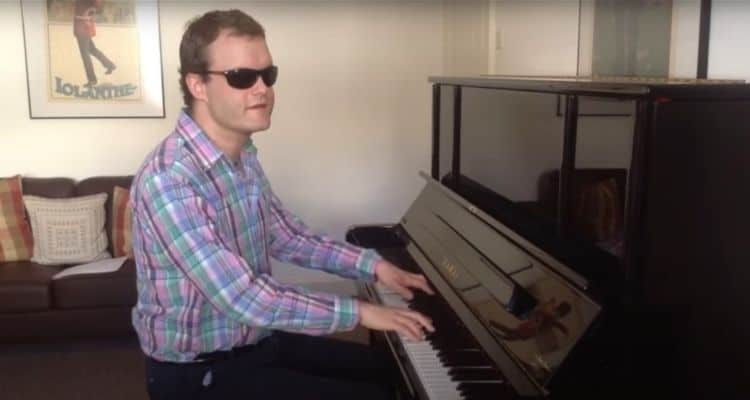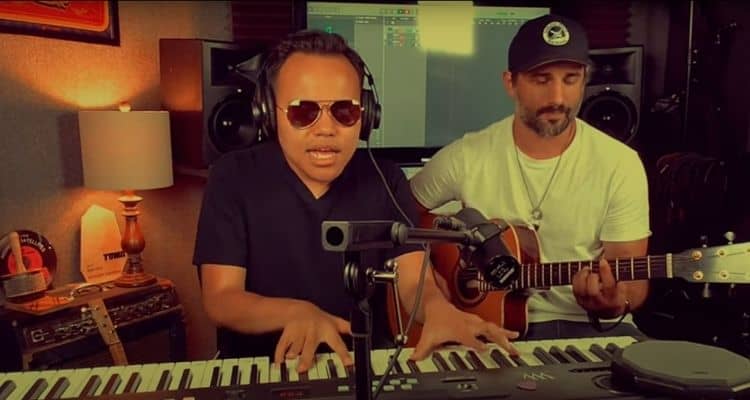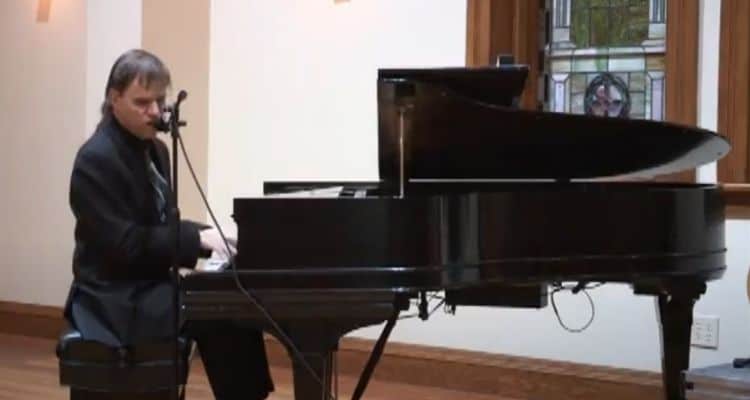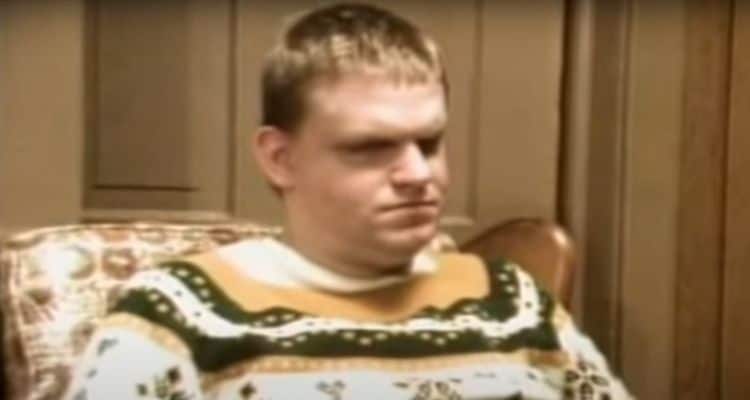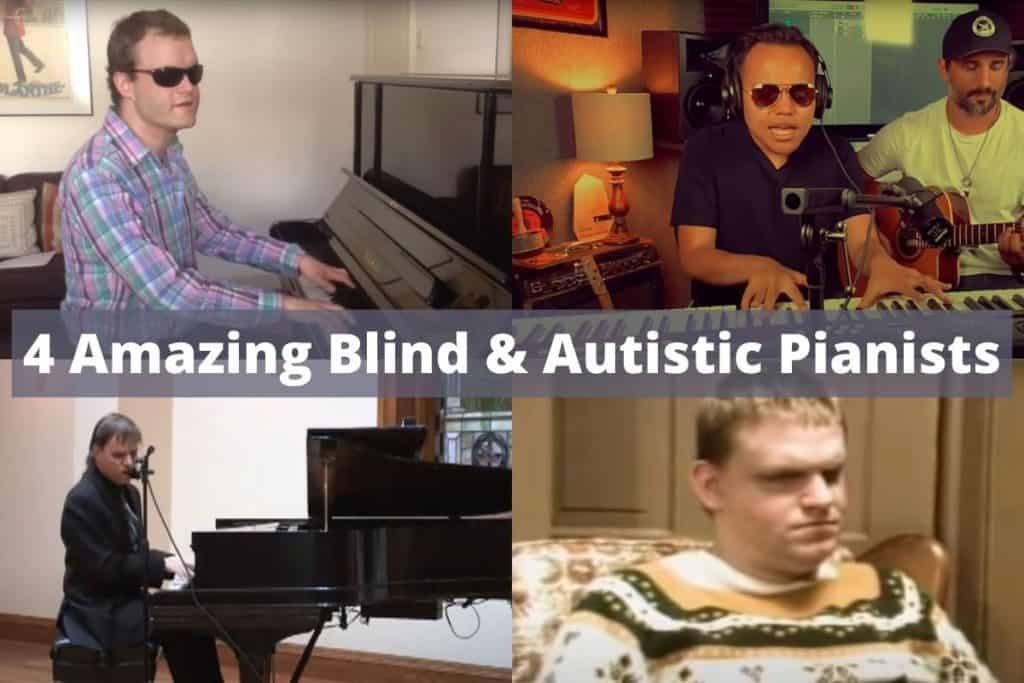
It usually takes a good chunk of someone’s lifetime, through extensive study and commitment, to become an expert in something. That’s why many of us are inspired by people who exceed well beyond perceived limits, despite disability or mental illness. Often they seemingly skip over the years it takes to master a skill, a feat which is particularly impressive in music.
Below, we meet four incredible musicians who have overcome tremendous personal struggles where each has an inspiring story to tell. Let’s learn more about these talented blind and autistic pianists.
Derek Paravicini
Born July 26, 1979, Derek Paravicini originally hails from Berkshire, England. He is known for having tens of thousands of pieces in his repertoire. He can learn and catalogue a piece of music in his memory by merely listening to it.
Early Life
Paravicini was born 15 weeks premature, weighing just a little over a pound. He lost his sight as a newborn baby when doctors administered oxygen therapy in order to save his life.
Paravicini began teaching himself piano when he was just 2 years old. He played his first concert when he was 7 years old, and only two years later, he was playing jazz with the Royal Philharmonic Pops Orchestra.
Student and Teacher
Adam Ockleford had begun volunteering at the Linden Lodge School for the Blind when he was a music student in London and found himself drawn to the incredible work the school was doing with blind and autistic music students.
When Ockleford first met Paravicini, he instantly recognized the child’s musical potential and began teaching him weekly, and then daily, piano lessons.
Ockleford says he was struck by Derek’s idiosyncratic playing techniques. Paravicini would play with his knuckles, the backs of his hands, even his elbows, having never seen anyone play the piano. It took over a decade of piano lessons to undo these bad habits in his playing.
When Paravicini began playing professionally, Ockelford would assist him and accompany him on his travels as his manager.
Derek Paravicini and Adam Ockelford still work together to this day, a relationship that began when Paravicini was just 5 years old.
A Career in Music
Paravicini has made history in several ways. In September 2011, he premiered a Matthew King composition, “Blue,” at Queen Elizabeth Hall in London. This was his family’s first significant step in pursuing a music career for him. “Blue” was the first piano concerto written explicitly for a performer with a learning impairment. The piece was based on Gershwin’s themes, written in a way that fit Paravicini’s unique set of playing abilities and allowed him to interact with the orchestra.
Paravicini’s family also made history by being the first to release their communications with the Court of Protections to the public. These documents stated that the family had legal permission to manage Paravicini’s affairs because of his disabilities.
A Typical Performance
Derek Paravicini loves to play jazz and improvise, but he also performs classical music. He will typically perform a set selection of pieces for the first half of his concert. Then for the second half, he’ll take requests from the audience. Audience members have fun trying to stump him, but they will rarely succeed. Even if Paravicini doesn’t recognize a song by its title, all he needs is to hear one line of the tune, and he can then recall and play it.
Watch Derek Paravicini Play
Here is a Ted Talk from 2013, featuring Derek Paravicini and his longtime teacher and mentor, Adam Ockelford:
And here is Derek playing “The Girl from Ipanema” with a live band:
Kodi Lee
Born July 7, 1996, Kodi Lee is best known for winning the 2014 season of America’s Got Talent.
Early Life
Kodi Lee was born prematurely with optic nerve hypoplasia and experienced life-saving surgery when he was just 5 days old. Later on, as a child, he was diagnosed with autism.
Lee dove into music at 4 years old, when a piano was donated to his family. His father played a simple song on the piano, and Lee sat down next to him and played the song right back. Lee’s mother says the music saved his life by giving him focus and direction.
America’s Got Talent
Kodi Lee wasn’t an established artist before his appearance on America’s Got Talent, the way many other artists are. He didn’t have a large social media following, and he hadn’t released any albums or singles.
Lee is the first blind person, and the first person known to have autism, to win America’s Got Talent. This has enormous implications for people with special needs and families affected by disability. America’s Got Talent judge Gabrielle Union recognized this when she said that Lee “hopefully will open up many more opportunities for so many individuals and families that are fighting tooth and nail every day to get attention and resources for all of our kids and make sure [they] have an equal opportunity to win at life, not just on the ‘AGT’ stage.“
Continuing Career
Now that Kodi Lee has won America’s Got Talent, he’s moving on to other things. Since the pandemic, he and his band have been performing virtual concerts and raising money for programs that support autistic children. Lee says that these programs helped him, and he likes to give back to the community and help people.
According to his brother, Lee is now also working on his first album.
Watch Kodi Lee Play
Here is Kodi Lee’s first 2019 America’s Got Talent appearance:
And here he is playing a cover of “Georgia on My Mind,” live in 2017:
Tony DeBlois
Born in Massachusetts in January 1974, Tony DeBlois was only the second of nine children to survive childbirth in his family. DeBlois had a rough start, staying in the hospital for the first five months of his life.
Early Musical Experiences and Growth
Tony DeBlois’s mother, Janice, brought home a toy chord organ from a garage sale when Tony was just 2 years old. Tony initially tinkered around on it, then quickly revealed his uncanny ability to hear and recall melody and harmony.
Although DeBlois didn’t speak until he was 15, he now sings in 11 languages.
Academics and Awards
DeBlois started going to school at Perkins School for the Blind, but upon discovering his musical prowess, he was awarded a summer scholarship to Berklee School of Music in Boston. DeBlois wound up graduating from Berklee magna cum laude in 1996.
DeBlois has been honored with a whole host of awards and accolades, including the Boston Celtics’ “Heroes Among Us” award in 2013 and the Ta-Kuan Cultural and Educational Foundations global “Love of Life” award in 2002.
Music Career
Tony DeBlois has at least a dozen albums released. He is primarily a jazz and pop musician who improvises freely. Along with his stellar piano abilities, he proficiently plays 11 other instruments.
DeBlois has composed music for several films, including “Fierce Love and Art: A Film About Autism and Creative Genius” and the upcoming 2021 film, “A Horse of a Different Color.”
Tony and his mother were also an inspiration for the film “Journey of the Heart,” loosely based on his childhood experiences.
Watch Tony DeBlois Play
Check out Tony DeBlois in the comfort of his own home, playing Sabre Dance:
And here’s DeBlois’s 2013 Tedx concert at the University of Massachusetts, Boston:
Leslie Lemke
Born in Milwaukee in 1952, Leslie Lemke developed glaucoma as a baby. He eventually had his eyes surgically removed and was diagnosed with cerebral palsy and “savant syndrome” (a no longer recognized diagnosis by medical experts).
He was adopted by May Lemke, who cared for him by teaching him how to swallow, speak, and walk voluntarily, all of which did not come to Lemke naturally.
Early Music Experiences
Lemke showed an interest and potential in rhythm and melody but didn’t begin playing the piano until he was 8. At age 14, he notably played Tchaikovsky’s Piano Concerto No. 1 after hearing it just once.
Music Career
Lemke has toured in Norway, Japan, and throughout the United States. He improvises and composes spontaneously and likes to take audience requests during his concerts.
His career took off shortly after performing a concert in Fond du Lac, Wisconsin, in June 1980. Walter Cronkite picked up recordings of the performance on the CBS Evening News, which led to Lemke appearing on television programs like 60 Minutes, Oprah, and Donahue.
The Lemke family was the inspiration for the 1993 movie “The Woman Who Willed a Miracle.”
Watch Leslie Lemke Play
Here’s a 1981 clip from ABC’s “That’s Incredible,” featuring Leslie and his mother:
Let Music Inspire You
This is just further proof that music can inspire and change lives. People with autism can experience particularly debilitating learning and social challenges. But for these four incredible pianists, music has been their gateway to improved life skills, expanded comfort zones, clearer communication, and enriching life experiences both for them and others that encounter them.
